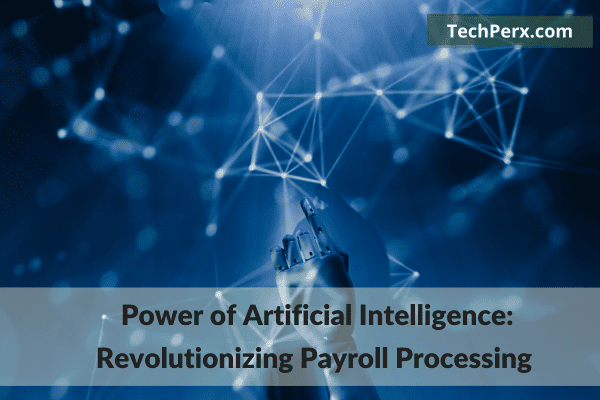In today’s fast-paced business world, companies are always looking for ways to make their operations more efficient and productive. One solution that has gained a lot of attention is the use of artificial intelligence (AI) in payroll processing. By leveraging AI, businesses can transform the way they manage payroll tasks, resulting in improved accuracy, efficiency, compliance, security, and advanced analytics. In this article, we will explore the benefits of using AI in payroll processing and how it can revolutionize payroll management for businesses.
Table of Contents
Understanding Artificial Intelligence in Payroll Processing
Artificial intelligence in payroll processing refers to the use of advanced technologies like machine learning and natural language processing to automate and optimize payroll tasks. By utilizing AI, businesses can eliminate manual processes, reduce errors, and gain valuable insights from payroll data.
1. Eliminating Human Error
Manual payroll processing is prone to errors, which can be costly for both companies and employees. With complex calculations and numerous variables involved, the risk of human error is high. AI eliminates the risk of human error by automating calculations and ensuring accurate payroll results. Common mistakes like miscalculations, incorrect tax deductions, and data entry errors are minimized, resulting in precise and error-free payroll processing.
By relying on AI-powered algorithms, businesses can avoid costly mistakes that can impact employee satisfaction and organizational compliance. The accuracy provided by AI in payroll processing instills confidence in employees that they will be compensated correctly and on time.
Also Read: Best Ai Paraphrase Tools You Can Use For Content Creation
2. Automated Data Processing
AI automates the collection, integration, and processing of payroll data, saving time and effort for HR departments. Real-time updates provide instant access to payroll information, reducing the need for manual data entry and reconciliation. Automated data processing ensures data accuracy, eliminates redundancy, and enables efficient payroll management.
The ability of AI to process large volumes of data quickly and accurately streamlines payroll operations. Instead of spending hours manually inputting and cross-referencing data, HR professionals can focus on analyzing the processed information and making informed decisions. This not only saves time but also enhances productivity and allows HR teams to allocate their resources more effectively.
3. Time and Cost Savings
The automation capabilities of AI lead to significant time and cost savings for businesses. Tasks that are repetitive and time-consuming, such as manual data entry and payroll calculations, can be automated. This allows HR teams to focus on more strategic initiatives that require human expertise and creativity.
By reducing manual labor, companies can optimize resources and allocate their budget more efficiently. The time saved through automation can be redirected towards activities that drive innovation, employee engagement, and talent development. Additionally, with increased accuracy, businesses can avoid costly errors and the subsequent financial implications.
Enhanced Compliance and Security
1. Ensuring Regulatory Compliance
Payroll processing involves navigating complex regulations and tax laws. Non-compliance can result in penalties, fines, legal issues, and damage to the company’s reputation. AI simplifies compliance by automating tax calculations, ensuring accurate deductions, and providing legal compliance checks.
AI-powered payroll systems are designed to stay up-to-date with changing regulations and automatically adjust calculations accordingly. This reduces the burden on HR professionals to manually keep track of regulatory changes and minimizes the risk of compliance-related errors. By leveraging AI, businesses can ensure payroll accuracy while adhering to legal and regulatory requirements.
Also Read: How DevOps Take Advantage of Artificial Intelligence
2. Data Security and Fraud Prevention
Protecting sensitive payroll data is crucial for businesses. AI provides robust security measures, such as encryption, authentication, and anomaly detection, to safeguard payroll information. By minimizing the risk of data breaches and unauthorized access, AI enhances data security and instills confidence in employees.
AI-powered payroll systems incorporate advanced security protocols to protect sensitive employee data. Encryption techniques ensure that data is transmitted and stored securely, mitigating the risk of unauthorized access. Additionally, AI algorithms can detect anomalies in payroll data patterns, helping to identify and prevent fraudulent activities.
Advanced Analytics and Insights
1. Predictive Analytics
AI leverages historical payroll data to make accurate predictions and forecasts. By analyzing patterns and trends, businesses can forecast employee costs, optimize budgeting, and allocate resources effectively. Predictive analytics enables proactive decision-making, allowing businesses to stay ahead of market fluctuations and make informed strategic choices.
AI-powered payroll systems can analyze vast amounts of data to identify patterns and correlations that may not be apparent to human analysts. This enables businesses to predict future payroll needs, anticipate fluctuations in labor costs, and make data-driven decisions. By leveraging predictive analytics, companies can optimize their budget allocations and ensure effective workforce management.
2. Reporting and Visualization
AI generates comprehensive reports and visualizations that provide valuable insights into payroll data. Data-driven reporting helps HR professionals identify trends, monitor key performance indicators, and measure the effectiveness of payroll strategies. Visual representations of data simplify complex information, facilitating better understanding and decision-making.
AI-powered payroll systems can generate customized reports and visualizations that present payroll data in a clear and concise manner. This enables HR professionals to extract actionable insights, identify areas for improvement, and track the effectiveness of payroll strategies. Visual representations, such as charts and graphs, make it easier to communicate complex information to stakeholders and support data-driven decision-making.
Overcoming Challenges and Future Implications
1. Addressing Concerns and Ethical Considerations
While AI brings numerous benefits, it’s important to address concerns and ethical considerations. Transparency in AI algorithms, bias mitigation, and responsible AI usage are essential aspects to consider. Businesses should prioritize ethical guidelines, ensure fairness in AI-driven decision-making, and provide clear explanations for automated payroll processes.
Transparency in AI algorithms is critical to building trust and mitigating concerns related to bias and fairness. It is important for businesses to implement AI systems that are explainable, meaning they provide clear insights into how decisions are made. By addressing ethical considerations and ensuring fairness in AI-driven payroll processing, businesses can build a foundation of trust among employees and stakeholders.
2. Future Implications and Advancements
The future of AI in payroll processing holds immense potential for advancements. As technology continues to evolve, AI systems will become more sophisticated and capable of handling increasingly complex payroll tasks. Adaptive learning algorithms can personalize the employee payroll experience, tailoring benefits and compensation packages to individual needs.
Future advancements in AI may also include advancements in natural language processing, voice recognition, and intelligent automation. These developments can further streamline payroll processes and enhance the user experience for HR professionals and employees alike. It is crucial for businesses to stay updated with emerging technologies and assess their potential for improving payroll management.
Conclusion:
Artificial intelligence is revolutionizing payroll processing, offering a wide range of benefits to businesses. By embracing AI, companies can achieve improved accuracy, efficiency, compliance, security, and advanced analytics. As businesses increasingly rely on data, AI-powered payroll processing becomes a critical tool for streamlining operations, optimizing resources, and making strategic decisions.
By eliminating human error, automating data processing, and saving time and costs, AI empowers HR professionals to focus on strategic initiatives and allocate resources more efficiently. Enhanced compliance and security measures provided by AI ensure that businesses adhere to regulatory requirements and protect sensitive employee data.
Definitely, an exceptional person while writing and creating content. Harry Rasmussen is someone with a scintillating personality. He has done his management studies and proudly came into the writing field. He creates fabulous consistency with detailing in his writing that anyone loves to read it.

